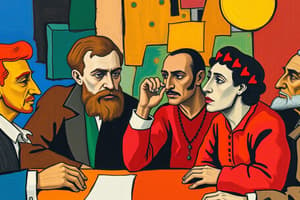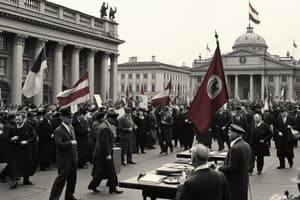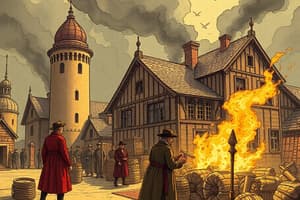Podcast
Questions and Answers
What was Louis Blanc's main proposal regarding cooperatives?
What was Louis Blanc's main proposal regarding cooperatives?
- To replace cooperatives with capitalist enterprises
- To abolish private property completely
- To encourage individual initiatives in cooperatives
- To have the government promote cooperatives (correct)
Karl Marx believed that the conditions of workers would improve under capitalism.
Karl Marx believed that the conditions of workers would improve under capitalism.
False (B)
What did Marx believe workers needed to do to free themselves from capitalist exploitation?
What did Marx believe workers needed to do to free themselves from capitalist exploitation?
Overthrow capitalism and construct a socialist society.
The _____ International was formed by socialists in the 1870s to coordinate efforts across Europe.
The _____ International was formed by socialists in the 1870s to coordinate efforts across Europe.
Match the following individuals with their contributions to socialist ideas:
Match the following individuals with their contributions to socialist ideas:
What led to the unpopularity of the Tsar Nicholas II during World War I?
What led to the unpopularity of the Tsar Nicholas II during World War I?
Over 7 million Russian soldiers were casualties by 1917 during World War I.
Over 7 million Russian soldiers were casualties by 1917 during World War I.
What drastic measure did the Russian army take while retreating during World War I?
What drastic measure did the Russian army take while retreating during World War I?
The name of St Petersburg was changed to __________ to reflect anti-German sentiment.
The name of St Petersburg was changed to __________ to reflect anti-German sentiment.
Match the following outcomes of World War I for Russia:
Match the following outcomes of World War I for Russia:
Flashcards are hidden until you start studying
Study Notes
Socialism and Cooperatives
- Socialists believed that cooperatives could be built on a large scale, but required government support.
- Louis Blanc advocated for government-encouraged cooperatives to replace capitalist enterprises in France.
- These cooperatives were envisioned as associations of people working together, sharing profits based on individual contributions.
Marx and Engels' Ideas
- Karl Marx and Friedrich Engels argued that industrial society was inherently capitalist.
- Capitalism was characterized by capitalists owning the means of production and workers generating profits for them.
- Marx believed that to free themselves from exploitation, workers needed to overthrow capitalism and establish a socialist society with social control of all property.
- This socialist society would be a communist society, where the workers would triumph over the capitalists.
Spread of Socialist Ideas
- Socialist ideas gained traction in Europe during the 1870s.
- Socialists formed the Second International, an international organization to coordinate their efforts.
- Workers in England and Germany organized associations to fight for improved living and working conditions.
The Russian Revolution
- The war was initially supported by Russians, who rallied behind Tsar Nicholas II.
- However, the Tsar's refusal to consult with the Duma, his wife's German origins, and the influence of Rasputin made the autocracy unpopular.
- The war on the eastern front was characterized by large-scale battles and heavy casualties, leading to disillusionment and demoralization among the Russian people.
- The Russian army suffered significant losses against Germany and Austria, with over 7 million casualties by 1917.
- The war also severely impacted industry, leading to food shortages and increased poverty.
Stalin’s Forced Collectivisation
- To address the shortcomings of agriculture, Stalin's government implemented a collectivization program.
- Peasants were forced to join collectivized farms (kolkhoz), losing their land and implements to the collective.
- Peasants resisted collectivization, fearing the loss of their autonomy and the potential for exploitation.
- This resistance led to harsh punishments, deportations, and exiles.
- The collectivization effort resulted in a significant decrease in cattle and contributed to widespread famine between 1930 and 1933, leading to the death of over 4 million people.
The Global Influence of the Russian Revolution and the USSR
- The Bolshevik revolution sparked global interest and inspired the formation of communist parties in various countries, including the Communist Party of Great Britain.
- The Bolsheviks actively encouraged colonial peoples to adopt their model.
- The USSR hosted the Conference of the Peoples of the East and the Comintern, fostering international socialist solidarity.
- The USSR provided education and support to international socialists through the Communist University of the Workers of the East.
- Despite initial acclaim, the Soviet government's policies diverged from the ideals of social equality and democratic participation championed by the Russian Revolution.
India’s Viewpoint on the USSR
- Indian revolutionaries, like Shaukat Usmani, were impressed by the USSR's apparent social equality and lack of caste or religious barriers.
- Rabindranath Tagore, however, observed the less glamorous side of the USSR, noting its lack of cleanliness and the focus on worker society.
- Both Indian observers were captivated by the Soviet Union's societal transformation and its dedication to social upliftment.
Studying That Suits You
Use AI to generate personalized quizzes and flashcards to suit your learning preferences.




